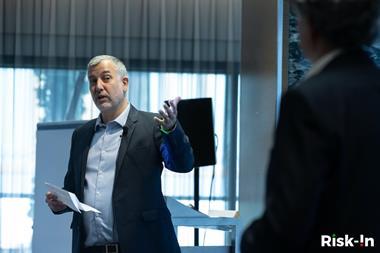Benedikt Hintze, senior risk and insurance manager, Georgsmarienhütte Holdings shares thoughts on #ChangingRisk and his new book, ‘Insurance Manager Convinces Company Boss’

Benedikt Hintze, senior risk and insurance manager, Georgsmarienhütte Holdingsv
If you had the power to change risk management, what would you do?
If I had the superpower of time traveling I’d use it to show which damages we avoided because of loss prevention and how much we increased our company longevity. There is only one present and one future and you are never able to tell what were the right decisions. Let’s say it’s a fire in the factory, €1bn damage, then it’s clearly visible. You can ask ‘why did it happen and what did we fail to do?’ But suppose with our actions we avoid this damage — you never know that you avoided it.
What irritates you about how risk management is perceived?
When risk management is considered to be a legal requirement. This frustrates me because apparently it seems to have no other benefit. Maybe, it would be better if it was not legally required. Then top management and shareholders would want to have risk management in place only if it provides value.
If you were to write a risk manifesto, what would be your number one point?
The number one would be hunting Black Swans. What are the key risks of tomorrow? This is certainly a major topic and usually the key risks of tomorrow are the strategic risks. I’m talking about risks that can occur 10, 30 or 50 years in the future. For example, evaluating the consumer marketplace or the competition in the market. People are usually looking only at the next business year but risk management does not stop in 2020.
What risk management operating model could be adopted in the future?
Probably no model at all. Models are off-the-shelf solutions. Yet, how can you compete in today’s highly competitive marketplaces by using mainstream solutions and benchmarking? I would have a risk management strategy and process that’s as tailor-made and unique as the overarching business strategy is. It’s what differentiates us from competitors.
Do board-level executives underestimate the value of risk management?
If you’ve reached a state of needing to persuade top management then it’s already too late. It’s a structural deficiency in risk culture. Of course, you can provide charts, diagrams and graphs, showing this and that. But in the end, convincing merely is not enough. As risk managers, we have to persuade with actions, not with words.
Would you like to change the name ‘risk manager’?
I despise the terms risk management and risk manager. Because yes, risk seems negative, and manage is so meaningless and unexciting. And actually the entire company deals with risks. No person alone owns a risk. Unfortunately, so far I have not found a better title for the job. And so, we are still risk managers.
What’s the most important lesson that you’ve learned?
Being human is all about taking risks since risk is only the other side of taking an opportunity. Sometimes I get the impression that risk management is about risk avoiding or worse – being risk averse. This is nonsense. Similar like John Maynard Keynes once quoted: „Only in the long run, we are all risk-averse.”
What’s on your mind right now?
My new and first book, ‘Insurance Manager Convinces Company Boss’. It begins with an insurance claim and the company boss asking, ‘why is this claim settlement taking so long?’ The idea is that a risk manager is explaining to a company boss about how the world of industrial insurance and risk management practically works. It evolves to the question of whether there will still be insurances in future, or if it will evaporate because the insurance market can no longer produce what we as risk managers need. It has been written in cooperation with GVNW and it shall be out for GVNW Symposium in September.




















No comments yet